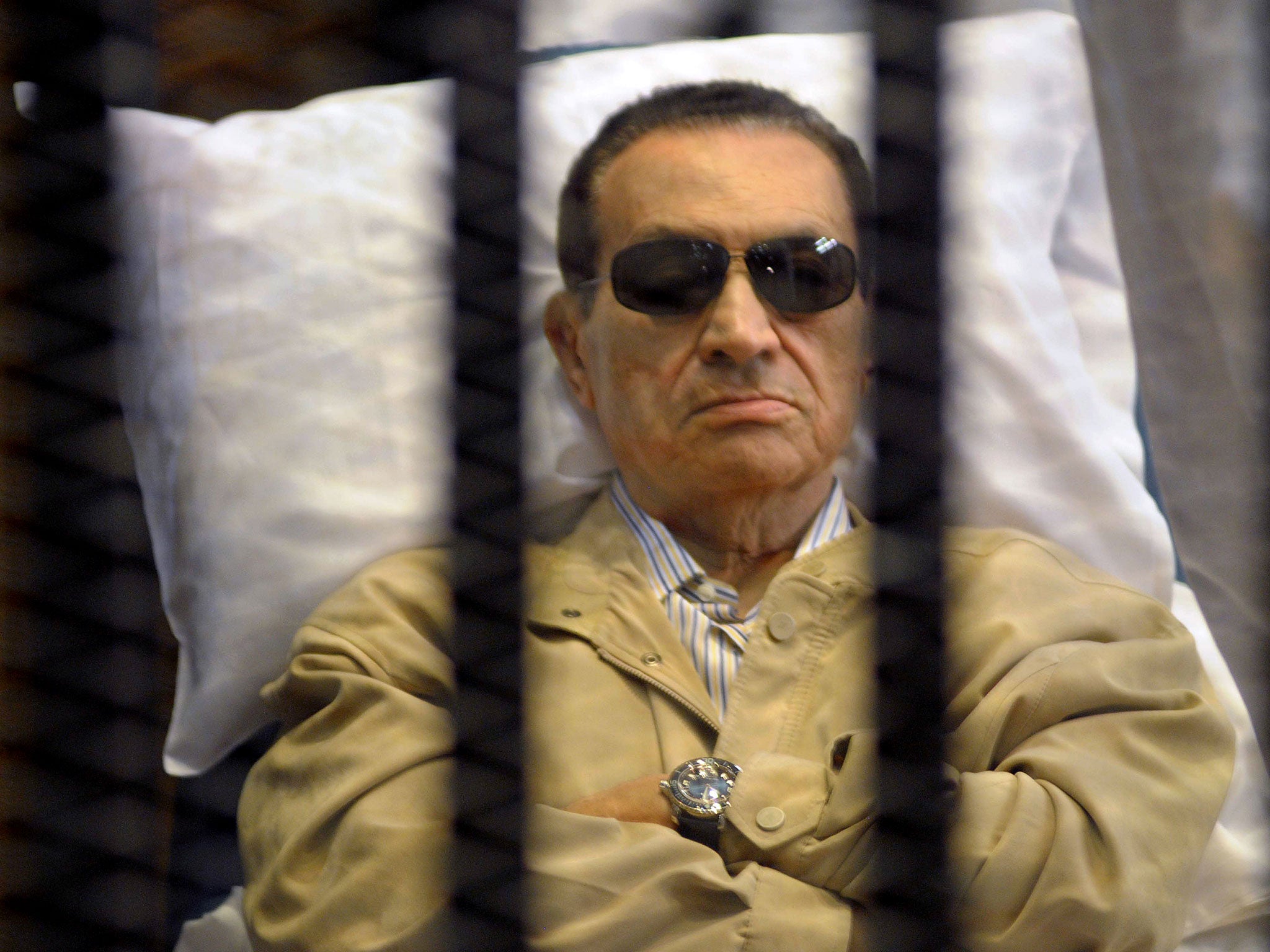The retrial that will seal the fate of Hosni Mubarak
There is always a danger that the retrial will provoke sympathy rather than revulsion, but Hosni is not, after all, the lucky chap he might have appeared to be a day or two ago


He will stay behind bars. A retrial is not a successful appeal, and – if Egypt’s judiciary gets its way – Hosni Mubarak will be even more firmly locked into prison for the rest of his life once he appears yet again before his judges.
Bleak House
Mohamed Morsi’s government dare not – and will not – free this elderly but petulant man for retirement in Sharm el-Sheikh after 800 protesters died in Egypt’s 2011 revolution. Under Mubarak himself, the laws were perverted. Now they have been reconstructed to entangle the corrupt – Mubarak included – in a Bleak House-web of legal argument, stronger evidence, endless trial postponements and yet further incarceration.
Crucial to all this is the new “Office to Protect the Revolution”, which is less ominous than its Nasserite title might suggest. Created last month, it must study a new report on the revolution of 2011, written by a fact-finding commission which is likely to be far less favourable to Mubarak’s security authorities than the evidence presented at the ex-president’s trial which ended seven months ago. Even the prosecutor – let alone the judge – said at the time that this evidence contained discrepancies.
Sympathy
There is always a danger that Mubarak’s retrial will provoke sympathy rather than revulsion. His supposed comas, his fluid in the lungs, his slips in the bathroom have all been meticulously recorded in the Cairo press. What do you expect to be the fate of an 84-year-old man? Egyptians are a forgiving people and, should Mubarak expire before he faces his judges yet again, no one will throw stones at his funeral.
But that is not what the judiciary has in store for him. New videotapes, new eyewitness evidence of the deliberate shooting down of demonstrators by Mubarak’s goons has been gathered over past months. There is talk that the then-president received a live video-feed of the killings. Which means he most certainly did order – by condoning – the killing of demonstrators in Tahrir Square.
Certainly this would not be good news for Habib al-Adly, the convicted interior minister who also faces a retrial. Besides, Mubarak is in addition still charged with receiving precious gifts from government institutions and his sons face very serious charges of corruption. Six ministerial aides who were effectively acquitted last year will also be retried. A totally different legal process is underway in Egypt, one that will not favour the old regime.
Justice
Of course, it’s worth recalling what happened to Mubarak’s pre-revolutionary insurgent enemies, the Islamists who rose up against his regime and tried to assassinate the man who was to rule Egypt for 30 years. They were arraigned before military courts. The prisoners held the Koran above their heads, and said from behind their iron cage – I heard them say this, many times – that even the lives of their wives were less important than God’s word. And then they were hanged. No appeals. No retrials. The Egyptian army did Mubarak’s bidding in those days.
Nor should we forget that justice in Egypt has always been taken seriously, if not always strenuously pursued. One of the greatest of Egyptian patriots, Saad Zaghloul, was a lawyer who led a Tahrir-like protest against the British authorities, only to be exiled to Malta and then the Seychelles, the Sharm el-Sheikh of its time. Zaghloul’s statue still towers through the Cairo smog above the Nile, more forbidding a presence than any memory of Mubarak.
Ghosts
So Hosni is not, after all, the lucky chap he might have appeared to be a day or two ago. There was always a chance that he might get away with an extraordinary appeal, even if Adly remained behind bars. The Mubarak “ghosts” still in power – the senior cops, the mid-level interior ministry thugs – would have liked to see Mubarak cleansed; it would help to wash their own sins away. Now they must wait to find out what new horrors are opened in the files of the interior ministry. Interrogation details, perhaps? Who knows, we may even find out who ordered the torture of the Arab Muslims whom George W Bush renditioned to Cairo for breaking.
But no. Some things are too sacred to be revealed. Too many billions of US aid flow into Egypt (and its army) for such justice to be rendered. Ben Ali got away with it. So, by and large, did the skeletons of the Yemeni regime. Gaddafi? Well, we sure backed the wrong camel there. The King of Bahrain? Why even our beloved Queen shook hands with the chap. Almost makes you feel sorry for Hosni.
Join our commenting forum
Join thought-provoking conversations, follow other Independent readers and see their replies
Comments